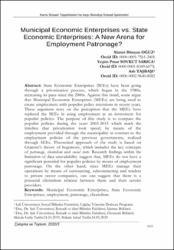| dc.contributor.author | Oğuz, Ahmet Bünyan | en_US |
| dc.contributor.author | Soykut Sarıca, Yeşim Pınar | en_US |
| dc.contributor.author | Taşbaşı, Aslı | en_US |
| dc.date.accessioned | 2021-11-24T03:59:28Z | |
| dc.date.available | 2021-11-24T03:59:28Z | |
| dc.date.issued | 2020-05-14 | |
| dc.identifier.citation | Oğuz, A. B., Soykut Sarıca, Y. P. & Taşbaşı, A. (2020). Municipal Economic Enterprises vs. State Economic Enterprises: a new arena for employment patronage?. Çalışma ve Toplum, 3(66), 1611-1631. | en_US |
| dc.identifier.issn | 1305-2837 | |
| dc.identifier.uri | https://hdl.handle.net/11729/3303 | |
| dc.identifier.uri | https://app.trdizin.gov.tr/makale/TkRJNE5EY3dNQT09 | |
| dc.description.abstract | State Economic Enterprises (SEEs) have been going through a privatization process, which began in the 1980s, increasing its pace since the 2000s. Against this trend, some argue that Municipal Economic Enterprises (MEEs) are being used to create employment with populist policy intentions in recent years. These argument rests on the perception that the MEEs have replaced the SEEs in using employment as an instrument for populist policies. The purpose of this study is to compare the populist policies during the years 2003-2015 which mark the timeline that privatization took speed, by means of the employment provided through the municipality in contrast to the employment policies of the previous governments, realized through SEEs. Theoretical approach of the study is based on Gramsci’s theory of hegemony, which includes the key concepts of patronage, clientelism and social state. Research findings within the limitation of data unavailability suggest that, MEEs do not have a significant potential for populist policies by means of employment patronage. On the other hand, since MEEs manage their operations by means of outsourcing, subcontracting and tenders to private sector companies, one can suggest that there is a potential clientelism relation between them and their service providers. | en_US |
| dc.description.abstract | Kamu İktisadi Teşebbüsleri (KİT) 1980'lerde başlayan ve 2000'li yıllardan itibaren hızını arttıran bir özelleştirme sürecinden geçmektedir. Öte yandan, Belediye Ekonomik İşletmeleri’nin (Bİİ) de popülist politika hedefleri ekseninde istihdam yaratma amaçlı kullanıldığına dair tartışmalar ortaya çıkmış bulunmaktadır. Söz konusu tartışmalar, Bİİ'nin popülist politikalar için bir araç olarak istihdamın kullanımında KİT’lerin yerini aldığı yönündeki kanıya dayanmaktadır. Bu çalışmanın başlıca amacı, özelleştirmenin hız kazandığı bir zaman çizelgesinde, 2006-2015 yılları arasında, belediyeler tarafından sağlanan istihdam ile önceki hükümetlerin KİT’ler üzerinden yürütülen istihdam politikalarının karşılaştırılmasıdır. Çalışmanın teorik yaklaşımı, patronaj, kliyentalizm ve sosyal devlet kavramlarını kapsayan Gramsci’nin Hegemonya Teorisi’ne dayanmaktadır. Konuyla ilgili verilere erişim sınırlılığı çerçevesinde araştırma bulguları, Bİİ'lerin, istihdama dayalı patronaj yoluyla popülist politikalar için önemli bir potansiyele sahip olmadığını göstermektedir. Diğer taraftan Bİİ, faaliyetlerini dış kaynak kullanımı, taşeronluk ve özel sektör şirketlerine ihale yoluyla yönettiğinden, kendileriyle hizmet sağlayıcıları arasında potansiyel bir kliyentalizm ilişkisi olabileceği düşünülebilir. | en_US |
| dc.language.iso | eng | en_US |
| dc.publisher | DİSK Birleşik Metal-İş | en_US |
| dc.rights | info:eu-repo/semantics/openAccess | en_US |
| dc.rights | Attribution-NonCommercial-NoDerivs 3.0 United States | * |
| dc.rights.uri | http://creativecommons.org/licenses/by-nc-nd/3.0/us/ | * |
| dc.subject | Clientelism | en_US |
| dc.subject | Employment | en_US |
| dc.subject | Municipal Economic Enterprises | en_US |
| dc.subject | Patronage | en_US |
| dc.subject | State Economic Enterprises | en_US |
| dc.subject | Belediye İktisadi İşletmeleri | en_US |
| dc.subject | İstihdam | en_US |
| dc.subject | Kamu İktisadi Teşebbüsleri | en_US |
| dc.subject | Kliyentalizm | en_US |
| dc.subject | Patronaj | en_US |
| dc.title | Municipal Economic Enterprises vs. State Economic Enterprises: a new arena for employment patronage? | en_US |
| dc.title.alternative | Kamu İktisadi Teşebbüsleri’ne karşı Belediye İktisadi İşletmeleri: patronaja dayalı istihdam için yeni bir alan mı? | en_US |
| dc.type | article | en_US |
| dc.description.version | Publisher's Version | en_US |
| dc.relation.journal | Çalışma ve Toplum | en_US |
| dc.contributor.department | Işık Üniversitesi, İktisadi ve İdari Bilimler Fakültesi, İşletme Bölümü | en_US |
| dc.contributor.department | Işık University, Faculty of Economics and Administrative Sciences, Department of Management | en_US |
| dc.contributor.department | Işık Üniversitesi, İktisadi ve İdari Bilimler Fakültesi, Ekonomi (İktisat) Bölümü | en_US |
| dc.contributor.department | Işık University, Faculty of Economics and Administrative Sciences, Department of Economics | en_US |
| dc.contributor.authorID | 0000-0001-7561-2405 | |
| dc.contributor.authorID | 0000-0001-8349-607X | |
| dc.contributor.authorID | 0000-0002-9640-8582 | |
| dc.identifier.volume | 3 | |
| dc.identifier.issue | 66 | |
| dc.identifier.startpage | 1611 | |
| dc.identifier.endpage | 1631 | |
| dc.peerreviewed | Yes | en_US |
| dc.publicationstatus | Published | en_US |
| dc.relation.publicationcategory | Makale - Ulusal Hakemli Dergi - Kurum Öğretim Elemanı | en_US |
| dc.contributor.institutionauthor | Oğuz, Ahmet Bünyan | en_US |
| dc.contributor.institutionauthor | Soykut Sarıca, Yeşim Pınar | en_US |
| dc.contributor.institutionauthor | Taşbaşı, Aslı | en_US |




















